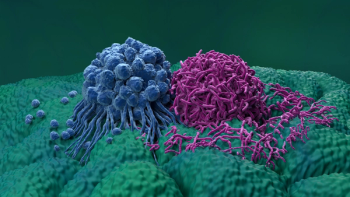
Liquid biopsies helped determine which patients with cervical cancer were at a high risk of recurrence following chemoradiation.

Liquid biopsies helped determine which patients with cervical cancer were at a high risk of recurrence following chemoradiation.

The FDA has approved encorafenib plus binimetinib to treat adults with metastatic non-small cell lung cancer with a BRAF V600E mutation.

The approval of FoundationOne CDx as a companion diagnostic for selpercatinib seeks to broaden access to therapies for patients with RET fusion–positive solid tumors.

Nivolumab plus chemotherapy offers patients with gastric and esophageal cancers a reduced risk of symptom burden and a longer time to deterioration.

Hyperthermic intraperitoneal chemotherapy, also known as hot chemotherapy bath, showed a long-term overall survival improvement in patients with stage III primary epithelial ovarian cancer.

Noël Arring, PhD, DNP, RN, and Debra L. Barton, PhD, RN, FAAN, FASCO, discuss clinical strategies to address sexual dysfunction in female cancer survivors.

Chemotherapy shortages are affecting patients across the country.

Takeda has announced that they will be voluntarily withdrawing mobocertinib for patients with EGFR exon 20 insertion mutation-positive non–small cell lung cancer.

The FDA Oncologic Drugs Advisory Committee voted 10-to-2 that findings from the phase 3 CodeBreaK 200 trial cannot be reliably interpreted.

Cervical cancer survivors who regularly engage in sex or use vaginal dilators report lower levels of vaginal shortening.

Sarita M. Taylor, BSN, RN, OCN, shares how she mentally recharges outside of the clinic.

Using diagnostic CT scans to create palliation plans may save time and improve the patient experience.

The FDA has granted marketing authorization to the Invitae Common Hereditary Cancers Panel, which can detect multiple genetic variants associated with hereditary cancers.

Patients with early breast cancer may safely choose a shorter course of radiation therapy following reconstruction.

Elizabeth Aronson, MSN, FNP-BCN, OCN, shares what stood out to her about the phase 2 MagnetisMM-3 trial assessing elranatamab in multiple myeloma.

Resistance training and walking can be beneficial for patients with multiple myeloma.

Patients who received pomalidomide, bortezomib, and dexamethasone achieved a median overall survival of 35.6 months compared with 31.6 months among patients treated with bortezomib and dexamethasone.

In a single-center retrospective analysis, the median progression-free survival among patients with multiple myeloma treated with teclistamab was 4.7 months.

Patients with EGFR-mutated non–small cell lung cancer had a median event-free survival of 30.8 months in the durvalumab arm and 19.6 months in the placebo arm.

Kristine Gibbons, RN, OCN, who is a Nurse Trainer at Florida Cancer Specialists & Research Institute, provides an in-depth look at elacestrant in a downloadable fact sheet.

Meredith Donahue, APRN-BC, discusses emerging therapies in metastatic prostate cancer.

Stephanie Russell, DNP, AGNP-C, highlights the importance of gender-neutral language in the oncology environment.

Lindsey Zinck, PhD, RN, OCN, NEA-BC, and Melania Zisa, RN, BSN, OCN, discuss why it may be time to make the bell ringing ceremony a more inclusive celebration in cancer care.

The FDA has approved bosutinib to treat pediatric patients with Philadelphia chromosome–positive, chronic-phase chronic myelogenous leukemia.

Congress needs to enact legislation that ensures chemotherapy shortages become a thing of the past.

Maura Price, MSN, RN, AOCNS, discusses common infusion-related reactions and the principles of desensitization.

The benmelstobart combination reduced the risk of death by 39% vs placebo plus chemotherapy in patients with extensive-stage small cell lung cancer.

The pathological complete response among patients who received durvalumab plus chemotherapy was 17.2% vs 4.3% in the placebo plus chemotherapy arm.

Data suggest that frontline treatment brentuximab vedotin elicits superior outcomes in patients with Hodgkin Lymphoma, regardless of PET2 results.

The FDA has granted belzutifan priority review designation based on data from the phase 3 LITESPARK-005 trial.